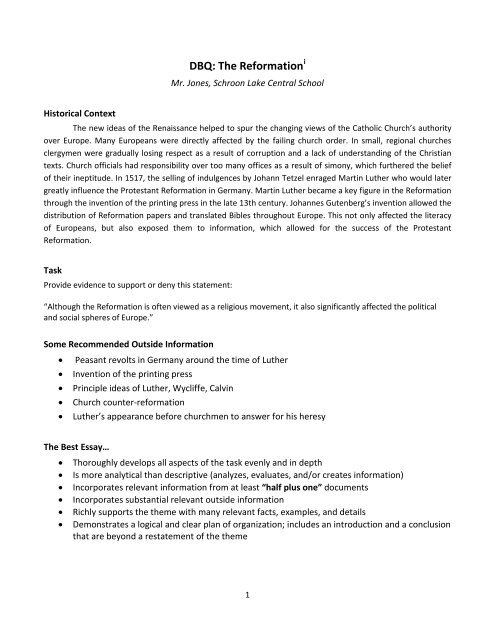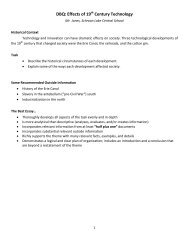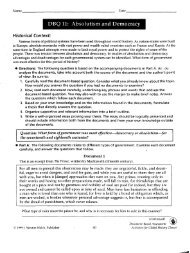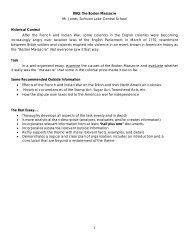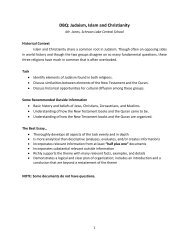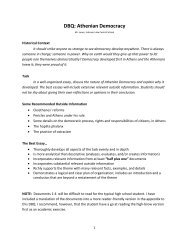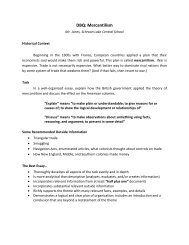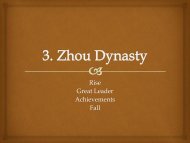DBQ The Reformation
DBQ: The Reformationi - JonesHistory.net
DBQ: The Reformationi - JonesHistory.net
- No tags were found...
You also want an ePaper? Increase the reach of your titles
YUMPU automatically turns print PDFs into web optimized ePapers that Google loves.
<strong>DBQ</strong>: <strong>The</strong> <strong>Reformation</strong> i<br />
Mr. Jones, Schroon Lake Central School<br />
Historical Context<br />
<strong>The</strong> new ideas of the Renaissance helped to spur the changing views of the Catholic Church’s authority<br />
over Europe. Many Europeans were directly affected by the failing church order. In small, regional churches<br />
clergymen were gradually losing respect as a result of corruption and a lack of understanding of the Christian<br />
texts. Church officials had responsibility over too many offices as a result of simony, which furthered the belief<br />
of their ineptitude. In 1517, the selling of indulgences by Johann Tetzel enraged Martin Luther who would later<br />
greatly influence the Protestant <strong>Reformation</strong> in Germany. Martin Luther became a key figure in the <strong>Reformation</strong><br />
through the invention of the printing press in the late 13th century. Johannes Gutenberg’s invention allowed the<br />
distribution of <strong>Reformation</strong> papers and translated Bibles throughout Europe. This not only affected the literacy<br />
of Europeans, but also exposed them to information, which allowed for the success of the Protestant<br />
<strong>Reformation</strong>.<br />
Task<br />
Provide evidence to support or deny this statement:<br />
“Although the <strong>Reformation</strong> is often viewed as a religious movement, it also significantly affected the political<br />
and social spheres of Europe.”<br />
Some Recommended Outside Information<br />
• Peasant revolts in Germany around the time of Luther<br />
• Invention of the printing press<br />
• Principle ideas of Luther, Wycliffe, Calvin<br />
• Church counter-reformation<br />
• Luther’s appearance before churchmen to answer for his heresy<br />
<strong>The</strong> Best Essay…<br />
• Thoroughly develops all aspects of the task evenly and in depth<br />
• Is more analytical than descriptive (analyzes, evaluates, and/or creates information)<br />
• Incorporates relevant information from at least “half plus one” documents<br />
• Incorporates substantial relevant outside information<br />
• Richly supports the theme with many relevant facts, examples, and details<br />
• Demonstrates a logical and clear plan of organization; includes an introduction and a conclusion<br />
that are beyond a restatement of the theme<br />
1
Document 1<br />
We have no one on earth to thank for this mischievous rebellion, except you lords and princes,<br />
especially you blind bishops and mad priests and monks....In your government you do nothing but flay<br />
and rob your subjects in order that you may lead a life of splendor and pride, until the poor common<br />
folk can bear it no longer.<br />
An Abomination of Peace (1525), Martin Luther criticizing German lords<br />
1. What does Luther say is the chief cause of the peasant revolts?<br />
Document 2<br />
27. It is mere human talk to preach that the soul flies out [of purgatory] immediately the money clinks in<br />
the collection-box.<br />
28. It is certain that when the penny jingles into the money box, gain and avarice can be increased, but<br />
the result of the intercession of the church is in the power of God alone.<br />
95 <strong>The</strong>ses (1517), Martin Luther<br />
1. What Church practice does Luther “put down” here?<br />
2
Document 3<br />
Depicts the use of the printing press, invented by Johannes Gutenberg. Allowed the spread of<br />
<strong>Reformation</strong> literature<br />
1. What was the influence of the printing press on the <strong>Reformation</strong>?<br />
Document 4<br />
As Christ by His birthright has obtained these two dignities, so He imparts and communicates them to<br />
every believer in Him, under that law of matrimony of which we have spoken above, by which all that is<br />
the husband's is also the wife's.<br />
Concerning Christian Liberty (1520), Martin Luther concerning marriage<br />
1. What practice does Luther defend here for priests?<br />
3
Document 5<br />
. . .In truth, the Jews, being foreigners, should possess nothing, and what they do possess should be<br />
ours. For they do not work, and we do not give them presents. Nonetheless, they keep our money and<br />
our goods and have become our masters in our own country and in their Dispersion. When a thief steals<br />
ten guldens, he is hanged; but when a Jew steals ten barrels of gold through his usury, he is prouder<br />
than the Lord himself! He boasts of it and strengthens his faith and his hatred of us, and thinks: ‘See how<br />
the Lord does not abandon His people in the Dispersion. We do not work, we are idle, and we pass the<br />
time pleasantly; the cursed goyim must work for us, and we have their money: thus we are their lords<br />
and they our servants!’ To this day we still do not know what devil brought them into our country; surely<br />
we did not go to seek them out in Jerusalem! No one wants them. <strong>The</strong> countryside and the roads are<br />
open to them; they may return to their country when they wish; we shall gladly give them presents to<br />
get rid of them, for they are a heavy burden on us, a scourge, a pestilence and misfortune for our<br />
country. This is proved by the fact they have often been expelled by force: from France (which they call<br />
Tsarpath), where they had a downy nest; recently from Spain, (which they call Sepharad), their chosen<br />
roost; and even this year from Bohemia, where, in Prague, they had another cherished nest; finally, in<br />
my own lifetime, from Ratisbon [Regensburg], Madgeburg, and from many other places. . . .<br />
On <strong>The</strong> Jews and <strong>The</strong>ir Lies (1543), Martin Luther's anti-Semitic pamphlet<br />
1. What are THREE evils Luther accused Jews of committing?<br />
2. What “proves” to Luther that Jews are evil?<br />
4
Document 6<br />
...they are starting a rebellion, and violently robbing and plundering monasteries and castles which are<br />
not theirs, by which they have a second time deserved death in body and soul, if only as highwaymen<br />
and murderers.... For rebellion is not simple murder, but is like a great fire, which attacks and lays waste<br />
a whole land.... <strong>The</strong>refore, let every-one who can, smite, slay and stain, secretly or openly, remembering<br />
that nothing can be more pod' venous, hurtful or devilish than a rebel....<br />
First, I will not oppose a ruler who, even though he does not tolerate the Gospel, will smite and punish<br />
these peasants without offering to submit the case to judgment. For he is within his rights, since the<br />
peasants are not contending any longer for the Gospel, but have become faithless, perjured,<br />
disobedient, rebellious murderers, robbers and blasphemers, whom even heathen rulers have the right<br />
and power to punish; nay, it is their duty to punish them, for it is just for this purpose that they bear the<br />
sword, and are "the ministers of God upon him that doeth evil....'<br />
Against the Robbing and Murdering Hordes of Peasants (1525), Martin Luther<br />
1. What stand does Luther take regarding the peasant revolts here?<br />
5
Document 7<br />
<strong>The</strong> Ship of Fools (1490-1500), Oil painting by Hieronymus Bosch portraying widespread contempt of<br />
priests and monks that had concubines and illegitimate offspring.<br />
1. What elements of the painting show contempt for the Church?<br />
6
Document 8<br />
"I cannot submit my faith either to the Pope or to the Councils, because it is clear as day they have<br />
frequently erred and contradicted each other. Unless therefore, I am convinced by the testimony of<br />
Scripture...I cannot and will not retract...Here I stand, I can do no other. So help my God, Amen."<br />
Martin Luther's reply when summoned to appear before the Emperor at the Diet of Worms<br />
1. Why does Luther say he cannot obey the Pope?<br />
Document 9<br />
Fifteenth Rule. We ought not, by way of custom, to speak much of predestination; but if in some way<br />
and at some times one speaks, let him so speak that the common people may not come into any error,<br />
as sometimes happens, saying; Whether I have to by saved or condemned is already determined, and no<br />
other thing can now be, through my doing well or ill; and with this, growing lazy, they become negligent<br />
in the works which led to the salvation and spiritual profit of their souls.<br />
From the Spiritual Exercises of Ignatius Loyola, part of Counter <strong>Reformation</strong><br />
1. With which Protestant reformer in particular would Loyola be disagreeing in this passage?<br />
Document 10<br />
Paul testifies that the Church is built on the foundation of the apostles and prophets, (Eph. 2:20). If the<br />
doctrine of the apostles and prophets is the foundation of the Church, the former must have had its<br />
certainty before the latter began to exist... For if the Christian Church was founded at first on the<br />
writings of the prophets, and the preaching of the apostles, that doctrine, wheresoever it may be found,<br />
was certainly ascertained and sanctioned antecedently to the Church, since, but for this, the Church<br />
herself never could have existed. Nothing therefore can be more absurd than the fiction, that the power<br />
of judging Scripture is in the Church, and that on her nod its certainty depends.<br />
Institutes of the Christian Religion; Book 1, Chapter 7, Section 2(1559), John Calvin<br />
1. What does Calvin show here to be the only source of Christian Truth?<br />
7
Document 11<br />
By the insinuation of many, if they are indeed worthy of belief, deploring it deeply, it has come to our<br />
ears that John de Wycliffe, rector of the church of Lutterworth, in the diocese of Lincoln, Professor of<br />
the Sacred Scriptures (would that he were not also Master of Errors), has fallen into such a detestable<br />
madness that he does not hesitate to dogmatize and publicly preach, or rather vomit forth from the<br />
recesses of his breast, certain propositions and conclusions which are erroneous and false. He has cast<br />
himself also into the depravity of preaching heretical dogmas which strive to subvert and weaken the<br />
state of the whole church and even secular polity, some of which doctrines, in changed terms, it is true,<br />
seem to express the perverse opinions and unlearned learning of Marsilio of Padua of cursed memory,<br />
and of John of Jandun, whose book is extant, rejected and cursed by our predecessor, Pope John XXII, of<br />
happy memory. This he has done in the kingdom of England, lately glorious in its power and in the<br />
abundance of its resources, but more glorious still in the glistening piety of its faith, and in the<br />
distinction of its sacred learning; producing also many men illustrious for their exact knowledge of the<br />
Holy Scriptures, mature in the gravity of their character, conspicuous in devotion, defenders of the<br />
Catholic Church. He has polluted certain of the faithful of Christ by sprinkling them with these doctrines,<br />
and led them away from the right paths of the aforesaid faith to the brink of perdition.<br />
Pope Gregory XI: <strong>The</strong> Condemnation of Wycliffe (1382), Gregory XI condemning John Wycliffe for<br />
questioning the Catholic Church. Wycliffe, an English theologian and reformer, was a precursor of the<br />
Protestant <strong>Reformation</strong><br />
1. Of what does Wycliffe stand accused?<br />
i<br />
http://www.angelfire.com/band2/reformation/<br />
8


